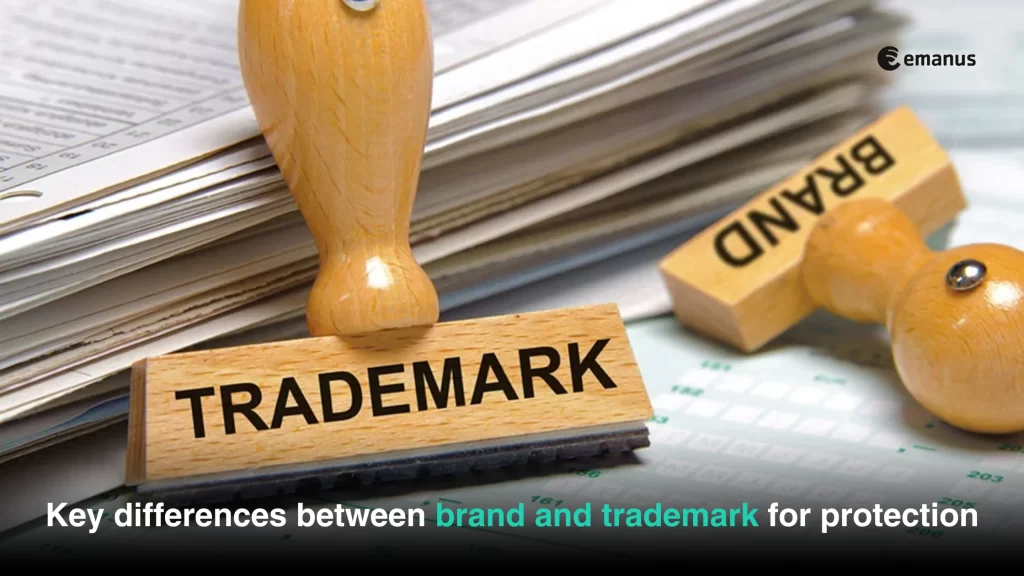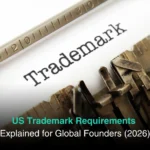When you’re starting or scaling a business, two terms you’ll hear often are brand and trademark. Many people assume they mean the same thing, but they don’t.
Both are essential. Your brand builds trust, while your trademark keeps that trust safe. And if you’re an Indian entrepreneur eyeing international growth, understanding the difference between brand and trademark could save you from costly mistakes.
What is a Brand?
A brand is more than a name or a logo. It’s the sum total of the experience, emotions and reputation you create in the minds of your customers.
Elements of a Brand
- Name – The business or product name people remember (e.g., TATA, Zomato).
- Logo – A visual mark (like the Air India Maharaja or Swiggy’s orange pin).
- Voice and Personality – The way your company communicates.
- Customer Experience – How people feel when they interact with your business.
Example: When people think of Amul, they don’t just think of butter. They think of trust, quality,and decades of witty advertising. That’s registered brand power.
A strong brand builds loyalty and drives growth. But without protection, anyone could copy it and that’s where trademarks come in.
What is a Trademark?
Definition
A trademark is defined as a legal right that protects your brand assets such as your name, logo, slogan or even unique packaging. It prevents competitors from using confusingly similar marks in the same industry.
Examples of Trademarks
- Amul – “The Taste of India” slogan
- Nike’s swoosh symbol
- Apple’s bitten apple logo
In India, trademarks are registered under the Trademarks Act, 1999. Once registered, you get exclusive rights and can sue anyone who tries to misuse your brand identity.
Learn the complete process of registering your first trademark here: How to Register a Trademark Guide and you can also check official definitions and registration details on the World Intellectual Property Organization (WIPO) website.
Differences Between Brand and Trademark
Definition
A brand is how people perceive your business. It lives in the customer’s mind and is built over time through reputation, marketing, and customer experience.
A trademark is a formal legal recognition of certain aspects of that brand like your name, logo or slogan.
Focus
The focus of a brand is emotional. It’s about building trust, loyalty and recognition.
A trademark focuses on legal exclusivity.
Existence
A brand exists the moment people start recognizing and associating value with your business. You don’t need to file paperwork.
A trademark only exists when you officially register it with a government authority.
Lifespan
A brand can last forever as long as customers continue to believe in it.
A trademark has a fixed legal life. In India, it’s valid for 10 years at a time but can be renewed indefinitely.
Keep your intellectual property active with our Trademark Renewal Guide to avoid lapses and ownership loss.
Example
Take Amul. As a brand, it represents trust and quality for Indian households. Legally, the word “Amul” and its logos are trademark brand names, ensuring no other dairy business can use the same name.
Why Having Both Matters
- A brand builds recognition – It tells customers who you are.
- A trademark keeps that recognition safe – It stops others from cashing in on your success.
- They add business value – Investors, partners, and customers trust businesses with strong branding and solid legal protection.
- Prevents losses – Trademark disputes can cost lakhs of rupees and years in court.
In short, your brand is your identity. Your trademark is your shield. Founders should follow a clear Trademark Strategy for Startups to protect their brand early and build investor confidence.
Why This Matters for Indian Innovators and Entrepreneurs
India is producing startups at record speed and many are going global. Here’s why you need to care:
- Global competition is tough – Without trademark protection, someone abroad could claim your brand and block you.
- Investors care – U.S. and EU investors often ask if your brand is protected before funding.
- Digital risk is real – Online, anyone can copy your name, logo, or even domain.
- Boosts credibility – A trademark builds trust and increases your valuation.
For innovators, the lesson is clear: Build your brand and protect it with trademarks early.
FAQs
1. Is brand name and trade name the same?
Not quite. A brand name is what customers know you by (like Apple or Coca-Cola). A trade name is your business’s official registered name. Sometimes they’re the same, sometimes not.
2. What is the difference between logo and trademark?
A logo is your design (like Nike’s swoosh). A trademark is the legal shield that stops others from copying that design.
3. Is trademark and copyright the same thing?
No. A trademark protects brand elements like names and logos. A copyright protects creative works like books, music or films. Example: Disney’s logo is a trademark; a Disney movie script is copyrighted.
4. Is Nike a brand or trademark?
Both! Nike is the registered brand we recognize, and “Nike” (plus the swoosh) are registered trademarks.
5. Can you have a brand without a trademark?
Yes—but risky. Without a registered trademark, anyone could legally use your name or logo.
6. What is stronger, TM or R?
™ means you’re claiming a brand element, but it’s not officially registered. ® means it’s registered and fully protected. ® wins.
7. Is Amazon a brand name or trademark?
It’s both—the brand people know, and a registered trademark that keeps the name and logo safe worldwide.
Conclusion
Your brand is what customers feel, and your trademark is what keeps that feeling safe. One builds recognition, the other protects it from being stolen. Together, they create lasting business value and safeguard your growth.
Now that you know the difference between brand and trademark, you can build your brand, secure it with a trademark and scale with confidence.
Start your registered brand journey now—schedule a call with Emanus.






